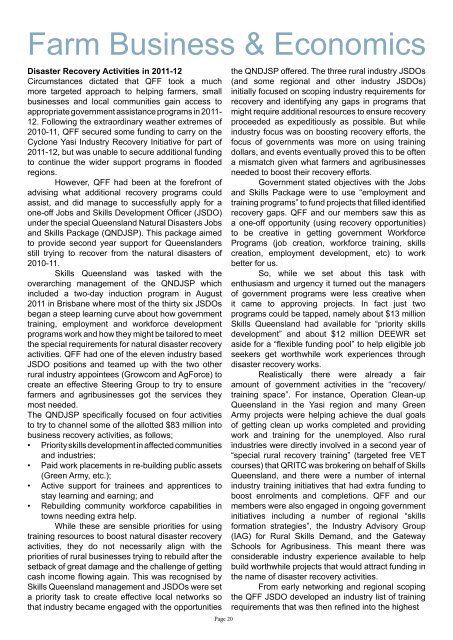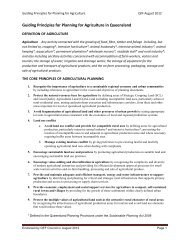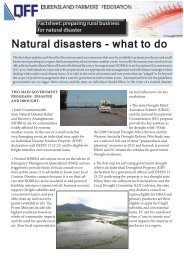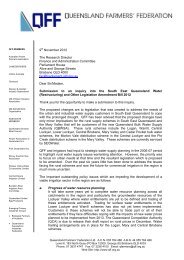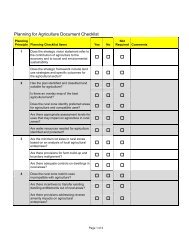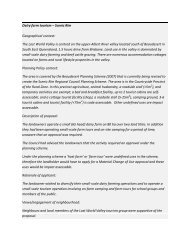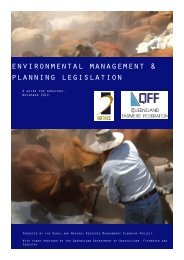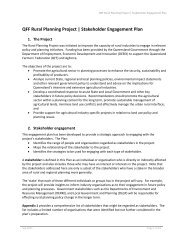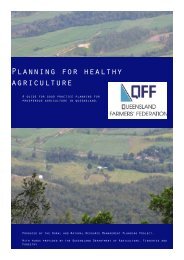here - Queensland Farmers Federation
here - Queensland Farmers Federation
here - Queensland Farmers Federation
You also want an ePaper? Increase the reach of your titles
YUMPU automatically turns print PDFs into web optimized ePapers that Google loves.
Farm Business & Economics<br />
Disaster Recovery Activities in 2011-12<br />
Circumstances dictated that QFF took a much<br />
more targeted approach to helping farmers, small<br />
businesses and local communities gain access to<br />
appropriate government assistance programs in 2011-<br />
12. Following the extraordinary weather extremes of<br />
2010-11, QFF secured some funding to carry on the<br />
Cyclone Yasi Industry Recovery Initiative for part of<br />
2011-12, but was unable to secure additional funding<br />
to continue the wider support programs in flooded<br />
regions.<br />
However, QFF had been at the forefront of<br />
advising what additional recovery programs could<br />
assist, and did manage to successfully apply for a<br />
one-off Jobs and Skills Development Officer (JSDO)<br />
under the special <strong>Queensland</strong> Natural Disasters Jobs<br />
and Skills Package (QNDJSP). This package aimed<br />
to provide second year support for <strong>Queensland</strong>ers<br />
still trying to recover from the natural disasters of<br />
2010-11.<br />
Skills <strong>Queensland</strong> was tasked with the<br />
overarching management of the QNDJSP which<br />
included a two-day induction program in August<br />
2011 in Brisbane w<strong>here</strong> most of the thirty six JSDOs<br />
began a steep learning curve about how government<br />
training, employment and workforce development<br />
programs work and how they might be tailored to meet<br />
the special requirements for natural disaster recovery<br />
activities. QFF had one of the eleven industry based<br />
JSDO positions and teamed up with the two other<br />
rural industry appointees (Growcom and AgForce) to<br />
create an effective Steering Group to try to ensure<br />
farmers and agribusinesses got the services they<br />
most needed.<br />
The QNDJSP specifically focused on four activities<br />
to try to channel some of the allotted $83 million into<br />
business recovery activities, as follows;<br />
• Priority skills development in affected communities<br />
and industries;<br />
• Paid work placements in re-building public assets<br />
(Green Army, etc.);<br />
• Active support for trainees and apprentices to<br />
stay learning and earning; and<br />
• Rebuilding community workforce capabilities in<br />
towns needing extra help.<br />
While these are sensible priorities for using<br />
training resources to boost natural disaster recovery<br />
activities, they do not necessarily align with the<br />
priorities of rural businesses trying to rebuild after the<br />
setback of great damage and the challenge of getting<br />
cash income flowing again. This was recognised by<br />
Skills <strong>Queensland</strong> management and JSDOs were set<br />
a priority task to create effective local networks so<br />
that industry became engaged with the opportunities<br />
Page 20<br />
the QNDJSP offered. The three rural industry JSDOs<br />
(and some regional and other industry JSDOs)<br />
initially focused on scoping industry requirements for<br />
recovery and identifying any gaps in programs that<br />
might require additional resources to ensure recovery<br />
proceeded as expeditiously as possible. But while<br />
industry focus was on boosting recovery efforts, the<br />
focus of governments was more on using training<br />
dollars, and events eventually proved this to be often<br />
a mismatch given what farmers and agribusinesses<br />
needed to boost their recovery efforts.<br />
Government stated objectives with the Jobs<br />
and Skills Package were to use “employment and<br />
training programs” to fund projects that filled identified<br />
recovery gaps. QFF and our members saw this as<br />
a one-off opportunity (using recovery opportunities)<br />
to be creative in getting government Workforce<br />
Programs (job creation, workforce training, skills<br />
creation, employment development, etc) to work<br />
better for us.<br />
So, while we set about this task with<br />
enthusiasm and urgency it turned out the managers<br />
of government programs were less creative when<br />
it came to approving projects. In fact just two<br />
programs could be tapped, namely about $13 million<br />
Skills <strong>Queensland</strong> had available for “priority skills<br />
development” and about $12 million DEEWR set<br />
aside for a “flexible funding pool” to help eligible job<br />
seekers get worthwhile work experiences through<br />
disaster recovery works.<br />
Realistically t<strong>here</strong> were already a fair<br />
amount of government activities in the “recovery/<br />
training space”. For instance, Operation Clean-up<br />
<strong>Queensland</strong> in the Yasi region and many Green<br />
Army projects were helping achieve the dual goals<br />
of getting clean up works completed and providing<br />
work and training for the unemployed. Also rural<br />
industries were directly involved in a second year of<br />
“special rural recovery training” (targeted free VET<br />
courses) that QRITC was brokering on behalf of Skills<br />
<strong>Queensland</strong>, and t<strong>here</strong> were a number of internal<br />
industry training initiatives that had extra funding to<br />
boost enrolments and completions. QFF and our<br />
members were also engaged in ongoing government<br />
initiatives including a number of regional “skills<br />
formation strategies”, the Industry Advisory Group<br />
(IAG) for Rural Skills Demand, and the Gateway<br />
Schools for Agribusiness. This meant t<strong>here</strong> was<br />
considerable industry experience available to help<br />
build worthwhile projects that would attract funding in<br />
the name of disaster recovery activities.<br />
From early networking and regional scoping<br />
the QFF JSDO developed an industry list of training<br />
requirements that was then refined into the highest


